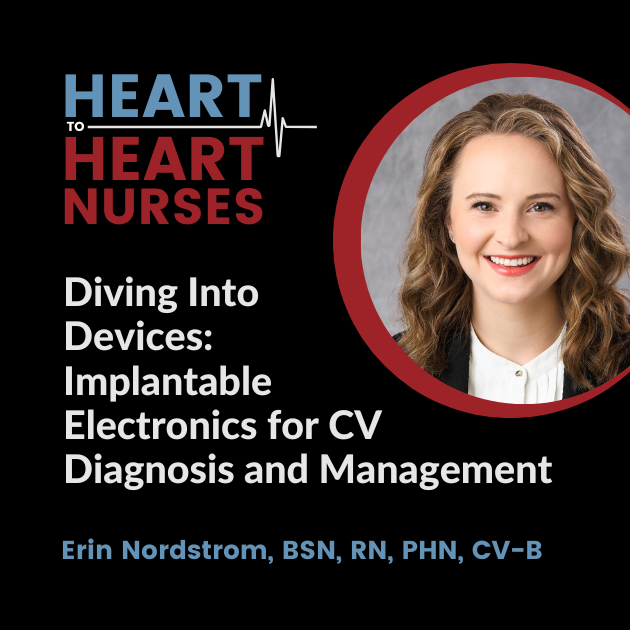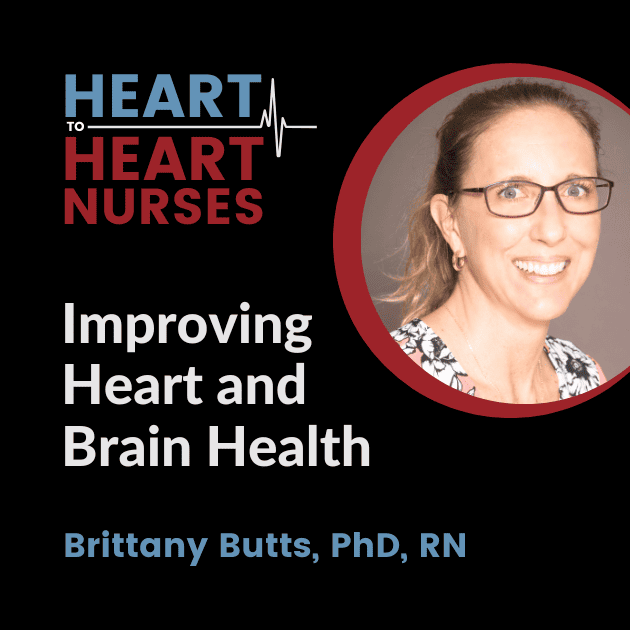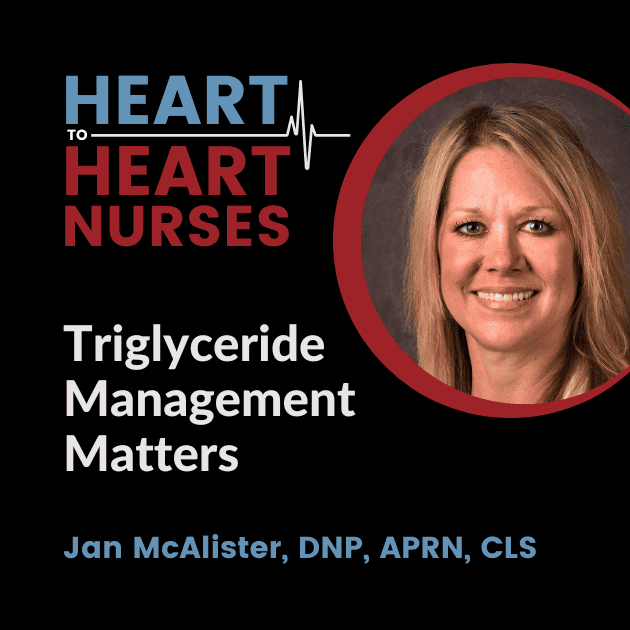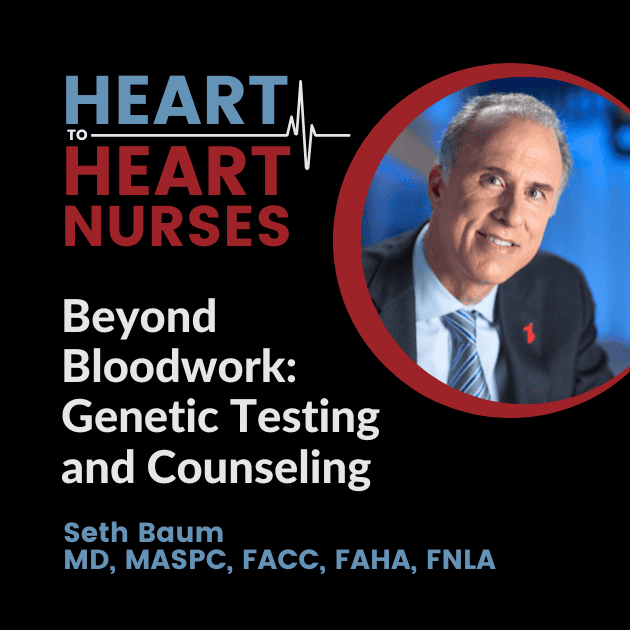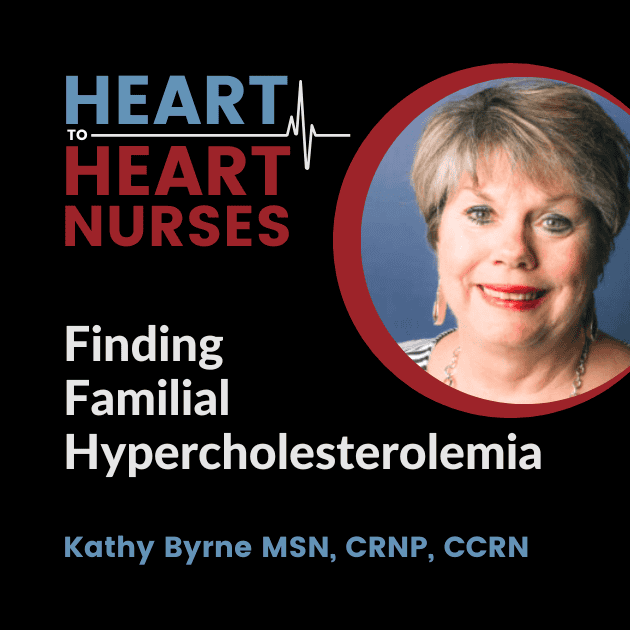In any healthcare setting, addressing social determinants of health requires moving beyond awareness to acknowledgment and action. Guests Bailey DeBlasis, MPH, MSW, LISW-S, and Emily Jones, PhD, RNC-OB, FAHA, FPCNA, describe how nurses are on the front lines of ensuring equitable and efficient care for all patients.
Episode Resources
- Health Equity Self-Assessment Tool - Designed to help healthcare professionals identify areas for improvement in their own practice regarding health equity. Take this 10-minute self-assessment and receive a tailored list of recommended health equity resources based on knowledge level.
Welcome to Heart to Heart Nurses, brought to you by the Preventive Cardiovascular Nurses Association. PCNA's Mission is to promote nurses as leaders in cardiovascular disease prevention and management.
Geralyn Warfield (host): I'd like to welcome our audience to today's episode where I have two exceptional guests and I'm going to allow them to introduce themselves to you.
Bailey DeBlasis (Guest): Oh, you first.
Emily Jones (Guest): Okay. Hi everyone. I'm Emily Jones. I'm a Professor of Nursing at the University of Oklahoma, Fran and Neuro Ziegler College of Nursing. I'm also an endowed chair there in Child and Family Health Sciences. And that's primarily because of my role as a nurse scientist. I do work in indigenous maternal health.
Geralyn Warfield (host): Excellent.
Bailey DeBlasis (Guest): And my name is Bailey DeBlasis. I work at The Ohio State University, Wexner Medical Center. I have a background in social work and recently just kind of moved operational. I have been studying public health, or graduated in a public health [00:01:00] program. So, I do social work and operations for a transitions of care team.
Geralyn Warfield (host): Well, we have a lot of expertise at the table today, and we're going to focus on a couple of different topics. And our first one is about the impact of social determinants of health, particularly on cardiovascular health outcomes. And so, I'm hoping you can illuminate that a little bit more for our audience. And I'm not sure who would like to go first.
Emily Jones (Guest): Sure. I'll set the stage for us.
In thinking about social determinants of health, I think right now nurses in a variety of care settings are very familiar with the term, and they might not have been a decade ago, or especially 20 years ago. But long before social determinants of health became a term that was familiar, nurses were positioned and trained to be able to incorporate knowledge of social determinants of health or those factors that are actually in the societal environment--maybe [00:02:00] beyond the individual level, but factors that impacted the direction of a person's health.
So, things like sanitation, and, poverty, or food access, or transportation. And really, those are areas where nursing has our roots, particularly in public health nursing.
So, you know, I think that that's important context for a contemporary conversation around social determinants.
Bailey DeBlasis (Guest): Yeah, I think specifically, so, the Transitions of Care program I work in is for heart failure. And I think the ones that we see the most often, the social aspects of their life that affect their illness are absolutely transportation, being able to get to their appointments.
And not even transportation. So, accessibility when thinking about being able to get to an appointment is also like physical health to be able to maneuver to that appointment.
Do they have access to the food they need to maintain their health or improve their health?
Do they have [00:03:00] a social support system that can support them in getting to their appointments or support them in changing those health behaviors that we're asking them to change?
So, I think the majority of the things that impact your health are beyond specific medical intervention. I think the majority of things that impact your health are social determinants of health.
Geralyn Warfield (host): I would agree. I had the opportunity a few years ago to go on a medical mission to Mexico. And my role, because I'm not a clinician, was to help out in the pharmacy just in terms of packaging the right number of pills, and sharing the instructions for taking those pills with the patients that we visited.
And it has not left my psyche to have had this interaction with this individual, and I was saying in Spanish to the individual, you know, “This is what you need to take, and you need to take it twice a day with food.”
And the individual said to me, “What if I don't eat during the day? What if I don't have enough food?”
And it really was just striking to me that we kind of make assumptions about what's available in the [00:04:00] community, what's available in the home, and you are so right that, that's kind of baseline health. That, you know, if transportation is an issue, if food is an issue, if access to a safe place to walk—I mean, if even leaving your home is a safety issue, which it is for many of our patients.
Then, you know, all those other layers in Maslow's hierarchy and in healthcare, really just nobody's paying attention to those. So, addressing those social determinants is really, really important.
So, let's talk specifically about transitions of care and how we can provide some best practices. And it doesn't matter what the clinical setting is. You know, people are transitioning from one facility to another, maybe one healthcare professional to another. How can we make that as smooth as possible?
Bailey DeBlasis (Guest): I think when thinking about that question, there's two primary things that stand out.
It's how can we be efficient and also how can we be equitable, right? So, how can we reach as many patients as possible? And also, how can we reach the patients in the way they need to be reached?
So, I guess an [00:05:00] example of that is when enrolling in programs, instead of just enrolling everyone in everything, it could be asking the patient, asking the treatment team, what do they need based off their specific situation. We're being responsible with our resources, we're being specific to the patient.
Emily Jones (Guest): You know, I think about in this setting of cardiovascular care, there are some really well-established transitions programs, whether or not they've been known as a “transitions” program. If you just think about cardiac rehab and how the top-level evidence-based cardiac rehabs play out, that's a successful transitions of care program.
However, we are in a place in time in this country where there's opportunities for all sorts of transition programs focused on lowering cardiometabolic risk that just don't exist. And one of these areas is in this space between perinatal or pregnancy and postpartum-related health. And the rest of life care that happens after that window.
And you know, that's an area [00:06:00] close to my heart, but in fact there are many gaps and many opportunities for us to think, in a team-based way, how do we advocate for services and programs that will fill this need?
Because the need is not being filled right now. And it's not that providers aren't aware of the gap. And it's not that they don't have the will to do something about it. It's that the systems don't support that kind of a transitions program from an obstetrical unit to a primary care, to the community.
So, there's all sorts of opportunities for us in this space.
Bailey DeBlasis (Guest): Well said. No, I think that's an amazing point. I mean, I think a lot of what I think about is always balance. And I think when you speak, I just think like how are we balancing our responsibility within the medical system and how are we balancing our responsibility within public health? And of course, a lot of us are doing both.
But we also need to be able to take care of ourselves and to be able to take care of [00:07:00] ourselves, we need to have a focus, right? So, it's kind of like, who's taking ownership for what? And we need both. It's not just the medical system. We need the structural support as well.
Geralyn Warfield (host): So, as we are headed to a quick break, I would like to thank Emily and Bailey for being here today to talk a little bit about how we can apply best practices to help all our patients, no matter their circumstances. We will be right back.
Geralyn Warfield (host): And we're back talking with Emily and Bailey about social determinants of health and how it can be a huge impact, not only for our patients, but also for what we do in clinical practice.
And I'm hoping we could discuss just a little bit about how we can support those patients for whom their social realities have shifted, maybe leading to competing priorities such as “I have to choose between food, medicine, and power this month.”
And just for our audience to keep in mind that this is not a one-time discussion with our people with whom we are working. That circumstances can change at any [00:08:00] time. So, it's important to be aware of this as time goes on, however you're interacting with these individuals.
So how about it? What do you think?
Bailey DeBlasis (Guest): My instinct is there's so much power in voicing the challenge, right? I think that sometimes there's a lack of trust between patients and the systems taking care of them, and it's because we're ignoring a part of their situation.
And I think if we can address it, even if we don't have the solution, it's still, “I see this as amazingly challenging for you,” instead of, “I see you're lacking adherence.” Right?
I think part of it's just really being aware of their reality's much bigger than this moment with you and voicing that out loud.
Emily Jones (Guest): Bailey, I love that you brought that up—the power in acknowledging. Because I think too often in nursing, and in healthcare perhaps more broadly, for providers, it's a really uncomfortable thing.
Bailey DeBlasis (Guest): Absolutely.
Emily Jones (Guest): To acknowledge something that may not be societally accepted, or there may be stigma or bias around it, not being able [00:09:00] to afford food being a prime example.
And yet, I think the literature as of late has begun to talk about gaslighting that occurs in healthcare settings. And while it might not just look like overt gaslighting, I think it is, if we act as though the education we're sharing with the patient in that moment is their reality when we both know it's not.
And so, there is so much honor, I think, and authenticity, and true care, that comes from just having that honest conversation and that builds trust. So, I think that, you know, that's a really important point that we may not take to heart when it comes to these conversations around the social determinants.
Geralyn Warfield (host): Is there anything else that you would like to add that I've neglected to ask so far?
Bailey DeBlasis (Guest): No. I mean, I think that this is such a big topic that that's a hard question to answer, right? And I think I've just been [00:10:00] really happy to have the conversation. Yeah.
Emily Jones (Guest): I will add one thing that I've learned really recently, and that's because of my participation in an NIH-funded study. And my primary research partner is a PhD in nutrition who is coming from a food security kind of lens, and food is medicine lens.
So, I learned recently that food insecurity, or food security based on which angle you're talking about, is really a great marker for many social determinants of health. And the literature is growing that supports that.
So sometimes, if a care provider, if a nurse, feels strapped in how to actually get a handle on what the social need is, that could be a really great first line screener that gives a much broader sense of where the constraints are for this individual and their family.
Geralyn Warfield (host): We are so grateful to you both for spending time with us today. Emily and Bailey, thank you [00:11:00] for helping continue the conversation and encouraging us to be holistic in how we're looking at our patients as we're seeing them in whatever application that is, whether it's a lab, in a clinic visit, maybe it's a community outreach setting.
And again, thanks so much for being here. This is your host, Geralyn Warfield, and we will see you next time.
Thank you for listening to Heart to Heart Nurses. We invite you to visit pcna.net for clinical resources, continuing education, and much more.
Subscribe Today
Don't miss an episode! Listen to the Heart to Heart Nurses podcast on your favorite podcast listening service.







